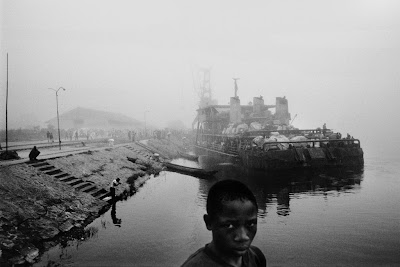Murhabazi read the
short message that beeped on his mobile phone. He was in an important meeting
with the UN, discussing children who were being forced to become soldiers in
the Democratic Republic of
the Congo. He looked around cautiously. Had
someone in the room sent him the death threat?
Murhabazi has made
many enemies during his struggle for the thousands of children being exploited
and tortured in war-torn DR Congo.
“The fight for children’s
rights here is a matter of life and death. And I’m prepared to die in that
fight, every day,” says Murhabazi Namegabe.
Murhabazi Namegabe
received The World's Children's Prize the World’s Children’s Prize 2011 for his
20-year long perilous struggle for children in the war-torn Democratic Republic of the Congo.
Since 1989, Murhabazi and his organisation BVES has freed 4,000 child soldiers
and more than 4,500 girls who have been sexually assaulted by armed groups, and
taken care of 4,600 unaccompanied refugee children.
His 35 homes and
schools offer some of the world’s most vulnerable children food, clothes, a
home, healthcare, therapy, the opportunity to go to school, security and love.
Most of the children are reunited with their families. Thanks to Murhabazi,
some 60,000 children have passed through the doors of BVES’ various centres and
been given a better life.
Murhabazi and BVES
represent children in DR Congo by constantly urging the government, all armed
groups, organisations and everyone else in society to look after the country’s
children.
Not everyone
supports Murhabazi’s struggle. He has been imprisoned and assaulted and is
constantly receiving death threats. Seven of his colleagues have been killed.
The war in Congo
The war in DR Congo
is one of the biggest and most brutal in the history of the world. It has been
going on since 1998. A peace agreement was reached in 2003, but fighting is
still continuing in the eastern parts of the country, which is home to the
children you see here.
• Around 5.4
million people have died, either in the fighting or from disease and starvation
as a direct result of the war.
• At its worst
there were over 30,000 child soldiers in the country. Thousands of them have
yet to be reunited with their families. The UN reports that 848 children were
forced to be soldiers in 2009.
• Some 200,000
rapes have been reported since the war began, but many believe that a lot more
women and girls have been exploited. In 2009, half of the victims were
children.
• Over 1.5 million
people in DR Congo are refugees.
• Over 5 million
children in DR Congo do not go to school.
Mobile phones and
computer games fuel war
DR Congo has
enormous riches. For example gold and diamonds, but also tungsten and coltan.
These are minerals that are used in the manufacture of mobile phones,
computers, computer games and MP3 players all round the world. The war today is
about who will have control over DR Congo’s mines and natural wealth.
The current
conflict followed in the wake of the genocide in neighbouring Rwanda in 1994,
during which almost 1 million people from the Tutsi ethnic group were murdered.
Thousands of the perpetrators fled to the forests of DR Congo, where they
remained. Suspicion was rife and a struggle for power broke out between Rwanda and DR
Congo, and soon seven countries were involved in one of the most brutal wars in
the history of the world.
As recently as
2001, the UN accused Rwanda,
Uganda and Zimbabwe of
encouraging the fighting in order to gather as many riches as possible.
In 2008, the UN
once again accused Rwanda
of keeping the war going. In 2009, the organisation Global Witness revealed
that fighting in DR Congo was now driven by European and Asian trade in the
manufacture of mobile phones, computers, computer games and MP3 players.
Companies from Belgium, the UK, Russia,
Malaysia, China and India were identified because they
bought minerals from various armed groups that were brutally violating
children’s rights. Companies were keeping the war going by buying the minerals.
The fact that politicians, businessmen and soldiers in Africa, Asia and the West are making huge amounts of money from
the war in DR Congo makes it difficult to put a stop to it.
Text: Andreas Lönn Photos: Bo Öhlén












































No comments:
Post a Comment